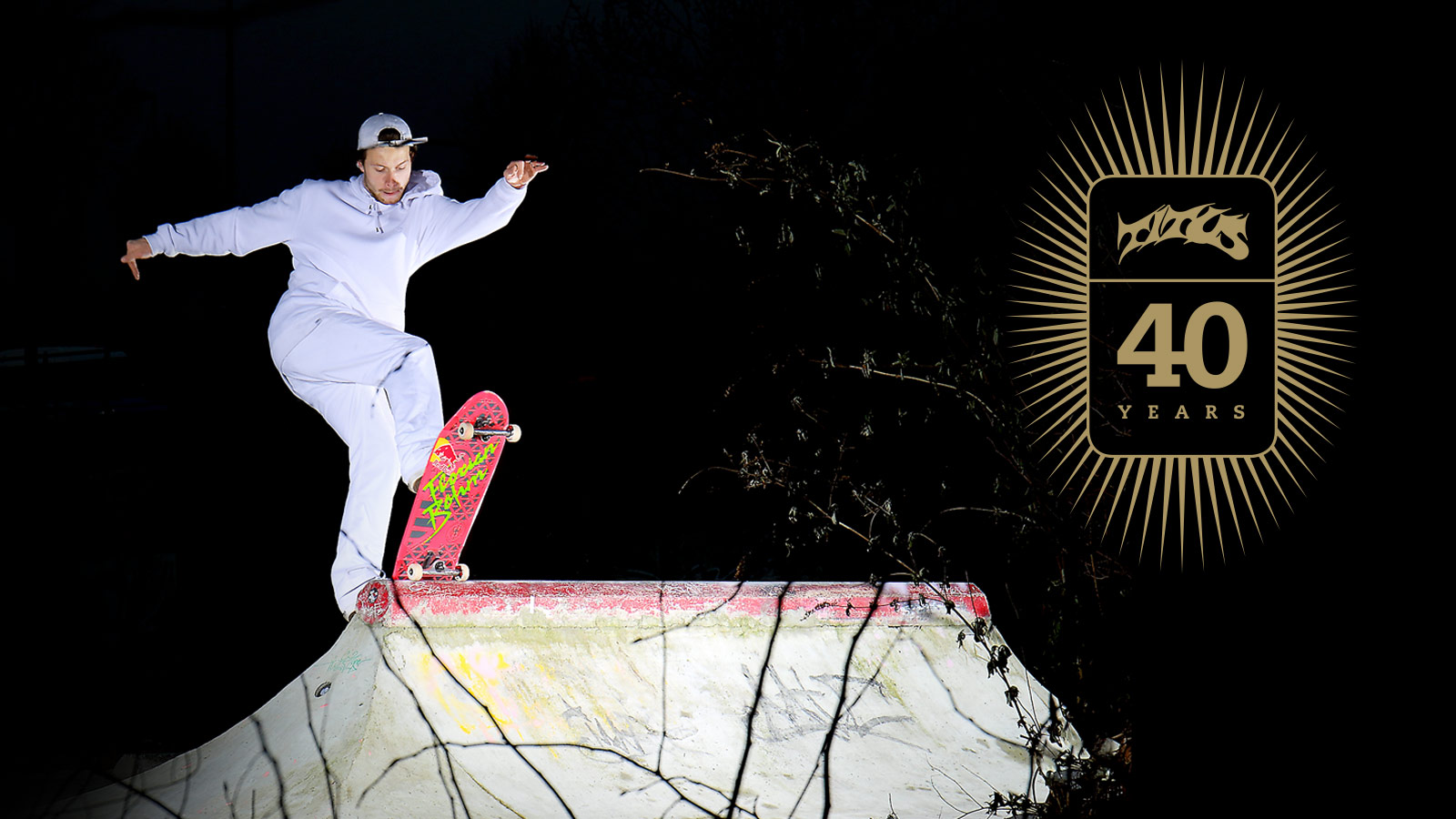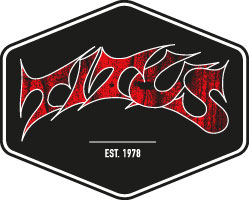1978-2018
40 YEARS HOME OF SKATEBOARDING

2018 is a big year for us – TITUS turns 40! In all these years, skateboarding has undergone a global development like nothing else in the world of sports and youth culture. We've seen the height of pool and vert skating in the 80's to the rise and popularity of street skating in the 90’s, think big pants and small wheels! We watched the limits of street skating be pushed farther than we ever thought possible in the early 2000's and then the mainstream popularity of skateboarding do the same. A decade after that, pool and park skating are as popular as street and skaters are doing tricks in contests that were never thought possible just years earlier. Through it all, TITUS has always remained on their journey to support the skateboarding community and, as always, we - KEEP PUSHING!
1978-1989
THE PIONEER DAYS
After Germany experienced its first skateboard "boom" in the early 70's, a nearly 30-year-old sports student by the name of Titus Dittmann saw something truly fascinating near the "Aasee" lake in Münster, a group of skateboarders! It wasn't long after Titus saw the skateboard before he wrote his first academic work on skateboarding while at the Hittorf Gymnasium. Titus saw how difficult it was to get skate stuff in Germany at the end of the 70's. So, he began importing skate products directly from the USA for his students. The first, small Titus "shop" would come soon after and he was suddenly the largest skateboard importer in Europe. 1982 was a critical year for Titus. The first Münster Monster Mastership took place in the parking lot of the Stadtbades Ost in Münster. Then, the Monster Skateboard Magazine was started with the help of Claus Grabke and Jörg Ludewig. The magazine was printed in Spain and it soon became the largest skate mag in Europe. In the coming years, a legendary "show team" was formed and the first European deck company with pro model boards was created by Titus. Claus Grabke held the title as the best vert skater at the time and was the first official "TITUS pro". In the mid-80's, skateboarding underwent another "boom" that further increased its popularity. In 1987, the Münster Monster Mastership took place in the Münster Eissporthalle with the title of the European championship. By this time, US pros had become aware of the contest and it quickly grew in popularity to the point of becoming arguably the most important skateboarding event worldwide. In 1989, we saw the completion of Skatepark Berg Fidel in Münster, just in time for the skateboarding world cup. The new park featured an integrated bowl and snake run unlike anything skaters at the time had seen. From then on, the Westphalia region of Germany earned a global reputation in skateboarding, and Titus was right in the middle of it!
1990-1998
VERT IS DEAD - STREETSKATING IS ALIVE
270 skaters from 26 nations, 25,000 spectators - These are true statistics from our 8th Münster Monster Mastership 1989! The incredible popularity of the "mastership" contest called for an even bigger venue in 1990. It was then held in an arena in Dortmund Keuninghaus where the crowd and skaters could truly go wild. In 1991, it was the start of a "new era" of skateboarding that would turn the entire skate industry upside down. Vert skating was becoming less relevant and skaters were taking to the streets. Skaters soon preferred smaller and smaller wheels for a lightweight board and pants were bigger and bigger for the style factor. Likewise, deck constructions were smaller to cater to more technical types of skating. The Monster Skateboard Magazine was still thick and colorful in 1991, but then had to be shrunk to a 52 page, black/white print mag just a year later. Seemingly countless new board companies were created, and Titus saw the opportunity to create their own under the name "T-Boards". In the summer of '93, the first T-Boards team video was produced with the help of Jens Schnabel titled "Trouble". The video featured German skate icons like Markus Müller, Nu Heinzel, Holger von Krosigk, Jörg Wiegratz and Konstantin Bear as well as a wide selection of other top German skate talent. In 1995, many of the top US pros were again at the Monster Mastership and we saw another spike in popularity. The Monster Magazine returned to colorful print in '96, the X-tra Sport event took place in Dortmund, and then the European Skate Open took place at the Jahrhunderthalle in Bochum in 1998. This was a turbulent, creative, and certainly very interesting time for skateboarding that we are proud to have lived through.
1999-2008
SKATEBOARDING GOES BIG-BUSINESS
The turn of the millennium was just on the horizon, but a new era in skateboarding had already begun in 1999. After Tony Hawk did the first 900, public interest in skateboarding in the United States spiked to an unprecedented level. Meanwhile, TITUS continued concentrating on the European scene. Together with Torsten Frank and Michael Rathgeb, we published the first German video magazine titled the "Monster Movie Mag (The Preview)". This video mag highlighted the German skate scene for the following six years, and we still highly recommend checking out each issue today! In 2000, the "Tony Hawk Pro Skater 2" video game was released and the skate industry was taken by storm. Suddenly, skateboarding brands had become household names and sales were outstanding across the board. The Monster Skateboard Magazine had 148 colored pages in 2002 and proved month after month the popularity that skating was experiencing. In 2003, young German talent Lem Villemin set new standards for German skating in the TITUS video "Schuss oder Schere". Due to the popularity of skateboarding, MTV took notice and we started TITUS TV with their help in 2005. The first season was hosted by Claus Grabke and featured the team around Maik Giersch. It was produced by filmmaker Michel Lohmann (Piratelove) and the Tonix production company. Then, we went on to a second season featuring host David Luther in 2006. However, MTV started going in a slightly different direction, focusing on dating shows and the like, while Titus TV was more of a "Jackass" style program. So, we decided to draw the line and end our bout of TV stardom. In 2005, the Monster Mastership returned to Münster for the first time in six years. Then, in 2008, we released the "Life Loving Skateboard Movement" video featuring our team riders such as Vladik Scholz, Denny Pham, and Wilko Grüning (RIP).
2009-2018
ALL TERRAIN SKATEBOARDING
After the big "boom" in the early 2000's, skateboarding finally returned to a more "normal level" of popularity near the end of the first decade. In 2011, Titus Dittmann made the big decision to hand over the business to his son Julius. Now, the company is again managed by an active skateboarder. Julius has taken a special interest during his time so far in further development of premium-quality deck constructions such as our T-Fiber decks, hardware from our own brands like TITUS TORNADOS and LITES TRUCKS, as well as working "in the field" on DIY projects across Germany. During this time, Team Titus manager Benni Markstein was also leading the Titus riders on an epic tour through the US and beyond to film the "Ist nicht leicht in Californien" and the "Gib mal Feuer Tour" videos. In 2012, a young German skater who was already known on an international level joined Team Titus, Jost Arens. In the same year, Yannick Schall took over team management from Benni Markstein and in 2013, our new in-house print magazine "Brettkollegen" was launched. The following year, we finished construction of a DIY Bowl in the parking lot of Skaters Palace by the Titus headquarters. We then celebrated accordingly with our first "DIY-Riot" event which now takes place each year. In 2015, Markus Blessing joined team Titus and we started filming the Titus "Ups and Downs" video. Jost Arens ended 2017 with a win of the German Championship at the COS-Cup in Rust, Germany, also the 20th anniversary of the event taking place there. Finally, 2018 marks the year that Titus has owned the title as "Home of Skateboarding" for 40 years. With that, it's time to do what we do best - celebrate!

